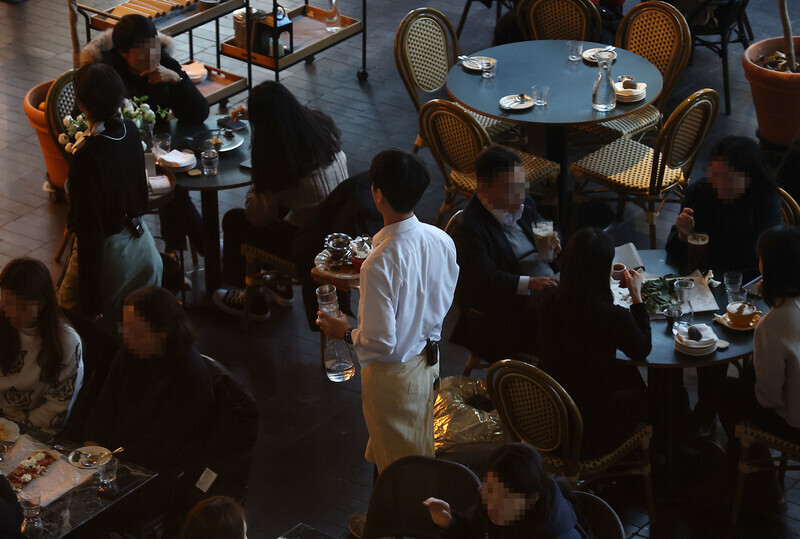hankyoreh
Links to other country sites 다른 나라 사이트 링크
[Column] How Korea’s restaurant servers went from being called ‘aunties’ to ‘bosses’


By Robert Fouser, linguist
While I was out for lunch the other day, waiting for my meal, I couldn’t help but pay attention to how the other diners at the restaurant tried to get the attention of the server. Each diner chose a different term: “Boss man!” (“sajangnim”), “Excuse me!” (“yeogiyo”), “Aunty!” (“imo”). I had no need to call for a server, but I pondered over what word I’d use if I did.
When I started studying Korean in 1983, I was told to say “Hello,” or “yeoboseyo,” when calling for a server. I found this interesting, as it’s the same way to answer a phone. But outside the classroom, I discovered that nobody said “Hello” when calling for a server. Instead, they often called out for “ajumma.” I soon adopted the term. Like the locals, I called women “ajumma” and men “ajeossi.” Although I’ve seen women call female servers “unnie,” I’ve never seen men call a waiter “hyeong.”
Once we entered the new millennium, I started feeling uncomfortable using the term “ajumma.” I still used the word “ajeossi,” but with lower frequency. The alternative of “Over here” sounded too authoritarian to me. It seems I wasn’t the only one who felt this way, as I started hearing more people say things like, “Excuse me, I’m ready to order.” Yet even this felt a bit too bossy.
These days, I hear people use the gender-neutral term “boss” a lot. With smaller businesses, it’s often the owner who takes the orders and serves the food, so this makes sense. Yet this seems improper for an employee working as a server. Yet I see many people use the term for servers as well — even if both the customer and the server know it’s inaccurate.
After the 2000s, South Korea started to show signs of recovery from the Asian financial crisis, commonly referred to by Koreans as simply “IMF.” As consumption and income steadily rose, the service industry boomed. From 2010 onward, the arrival of social media accelerated the flow of information, allowing customers to rate restaurants and businesses in real time. In person, city slickers became increasingly closed off to strangers, building their social walls higher while drawing clearer personal boundaries. Any sort of appellation that intruded across another person’s boundary started feeling old-fashioned, making “boss man” appear that much better than “ajumma” or “ajeossi.”
But titles aren’t the only thing that has changed. Up until the end of the 20th century, it was common for customers to abandon honorifics for informal speech when addressing servers who were clearly much older. This wasn’t considered rude. It was accepted as endearing. As time went on, however, people started drawing sharper delineations between friends and strangers. In the 21st century, it was rare to see customers using informal speech with servers, although people still kept a casual tone that wouldn’t be proper for addressing a professional superior. It was like two acquaintances who weren’t quite friends. This is why some people call female servers “Auntie.”
Since Korean isn’t my mother tongue, I still struggle with which words to use when trying to call a server. “Boss,” or literally “Mr./Ms. President,” feels too honorific. Yet “auntie” feels straight-up cringe. “Ajumma” and “ajeossi” feel outdated and insulting, and “Over here” feels bossy. Lately, I try to make eye contact before saying, “Hello.” It feels unnatural — for both me and the server, but I’m usually greeted with a friendly face.
Funny enough, even servers have changed the way they address customers. In the late 1990s, it was common for restaurant owners to call young men “student” or “bachelor.” These days, almost nobody does that. Small businesses strictly adhere to the title of “customer,” while corporations will call you their “guest.” To me, these terms feel a bit lifeless.
Ultimately, I’m still not sure of the proper language. Most likely, both customers and servers are still searching for the proper words. When both parties finally find the right words, I wonder what they’ll be. I wonder how people will address each other in restaurants across the country.
Please direct questions or comments to [english@hani.co.kr]

Editorial・opinion
![[Editorial] It’s time for us all to rethink our approach to North Korea [Editorial] It’s time for us all to rethink our approach to North Korea](https://flexible.img.hani.co.kr/flexible/normal/500/300/imgdb/original/2024/0621/7517189559819182.jpg) [Editorial] It’s time for us all to rethink our approach to North Korea
[Editorial] It’s time for us all to rethink our approach to North Korea![[Column] Why empty gestures matter more than ever [Column] Why empty gestures matter more than ever](https://flexible.img.hani.co.kr/flexible/normal/500/300/imgdb/original/2024/0619/7217187833478369.jpg) [Column] Why empty gestures matter more than ever
[Column] Why empty gestures matter more than ever- [Editorial] Seoul’s part in N. Korea, Russia upgrading ties to a ‘strategic partnership’
- [Column] The tragedy of Korea’s perpetually self-sabotaging diplomacy with Japan
- [Column] Moon Jae-in’s defense doublethink
- [Column] S. Korea-China cooperation still has a long way to go
- [Editorial] Seoul must use tact and diplomacy to check deepening Russia-NK ties
- [Editorial] Thorough audit, evaluation of oil test drilling are needed
- [Editorial] Yoon prioritizes his administration over South Korea’s safety once again
- [Column] The monumental shift in N. Korea’s nuclear program that never happened
Most viewed articles
- 1[Editorial] It’s time for us all to rethink our approach to North Korea
- 2[News analysis] N. Korea’s new pact with Russia is ‘mirror image’ of Yoon’s alliance with US
- 3North Korea’s real motive for publishing the full text of new treaty with Russia
- 4Seoul hints at lethal weapons aid to Ukraine to put pressure on Russia
- 5Seoul decries N. Korea-Russia mutual defense pact as ‘absurd’
- 6Hot weather hat trick to send the mercury soaring in Korea
- 722 years later, Korean girls killed by US troops remain a symbol of the price of military tensions
- 8[Editorial] Seoul’s part in N. Korea, Russia upgrading ties to a ‘strategic partnership’
- 9[Editorial] Fortified N. Korea-Russia ties should be a wakeup call for Seoul
- 10Putin, Kim pledge ‘mutual assistance’ in event of outside aggression